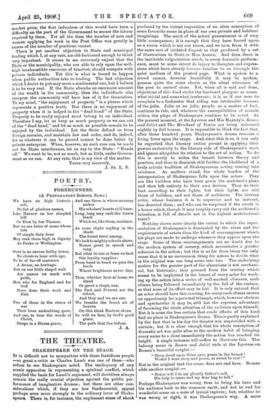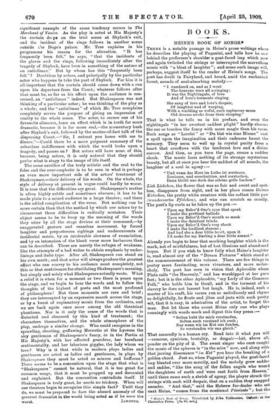THE THEATRE.
SHAKESPEARE ON THE STAGE.
IT is difficult not to sympathise with those fastidious people —so great a critic as Charles Lamb was one of them—who refuse to see Shakespeare acted. The inadequacy of any scenic apparatus in representing a spiritual conflict, which supplied the basis for Lamb's argument, will doubtless always remain the really crucial objection against the public per- formance of imaginative dramas ; but there are other con- siderations which, if they are lees fundamental, appeal perhaps even more strongly to the ordinary lover of Shake- speare. There is, for instance, the unpleasant sense of shock produced by the violent imposition of an alien conception of' some favourite scene in plaCe of our own private and habitual imaginings. The merit of the actors' presentment is of very
little consequence; it is enough that they have forced upon us a vision which is not our vision, and we turn from it with. the same sort of irritated disgust as that produced by a set: of illustrations to Scott or Miss Austen. And then there ia the inevitable vulgarisation which, in every dramatic perform- ance, must to some extent do injury to thoughts and expres- sions which have already become familiar to us through the-. quiet medium of the printed page. What is spoken to a- crowd cannot, however beautifully it may be spoken, possess quite the same charm as the silent utterance of the poet to oneself alone. Yet, when all is said and done,. objections of this kind strike the hardened playgoer as sonic- what trivial and somewhat irrelevant; it is as if one were to. complain to a foxhunter that riding was intolerable because • of the jolts. Jolts or no jolts, people, as a matter of fact,. 'continue to ride, and, whatever the susceptibilities of certain. critics, the plays of Shakespeare continue to be acted. At the present moment, at the Lyceum and His Majesty's, Romeo and Juliet and The Merchant of Venice are being welcomed. nightly by full houses. It is impossible to blink the fact that,. after three hundred years, Shakespeare's drama remains a- living force upon the stage. And since this is so, it can only be regretted that literary critics persist in applying their - powers exclusively to the literary side of Shakespeare's work and ignore altogether its relation to the art of acting. To do- this is merely to widen the breach between theory and. practice, and thus to diminish still further the likelihood of a. truly artistic tradition of Shakespearean acting coming into. existence. As matters stand, the whole burden of the- interpretation of Shakespeare falls upon the actors. They- are like builders who have been given the architect's plans- and then left entirely to their own devices. They do their- best according to their lights, but their lights are still' those of builders, and not those of architects. The literary • critic, whose business it is to supervise and to instruct,. has deserted them; and who can be surprised if the result is- a house which, though it may roughly carry out the architect's.. intention, is full of details not in the highest architectural/ taste ?
Nothing shows more clearly the extent to which the repre- sentation of Shakespeare is dominated by the views and the- requirements of actors than the kind of rearrangement which./ his plays are made to undergo whenever they appear upon the- stage. Some of these rearrangements are no doubt due to- the modern system of scenery, which necessitates a greater- cohesion in the action; but this is so far from being the only- cause that it is no uncommon thing for actors to divide what- in the original was one long scene into two. The underlying.- motive for the greater part of the alterations is not mechani- cal, but histrionic; they proceed from the craving which. seems to be implanted in the breast of every actor for work- ing up the action into a series of well-marked climaxes, each. climax being followed immediately by the fall of the curtain,. so that none of its effect may be lost. It is only natural that. an actor should have this craving, for every such climax means an opportunity for a personal triumph, which, however obvious. and spectacular it may be, still has the supreme advantage- of focussing the whole attention of the audience upon himself- But it is none the less certain that crude effects of this kind) find no place in Shakespeare's drama. This is partly explained. by the fact that in his day the theatre was unprovided with a/- curtain; but it is clear enough that his whole conception of " dramatic art was quite alien to the modern habit of bringing: every scene to a close immediately the action has reached its- height. A single instance will suffice to illustrate this. The- balcony scene in Romeo and Juliet ends at the Lyceum on. Romeo's beautiful couplet :— "Sleep dwell upon thine eyes, peace in thy breast !
Would I were sleep and peace, so sweet to rest! "
But in the original text the scene does not end here.- Romeo- adds another couplet :—
" Hence will I to my ghostly father's cell, His help to crave and my dear hap to tell."
Perhaps Shakeipeare- was wrong thus to bring his hero and his audience back to the common earth, and not to end his/ wonderful scene on a note of lyrical rapture ; but, whether he was wrong or right, it was Shakespeare's -way. A More significant example of the same tendency occurs in The Merchant of Venice. As the play is acted at His Majesty's the curtain dr( ps on the trial scene at Shy-lock's exit, and the incident of the rings follows in another scene outside the Doge's palace. Mr. Tree explains in his programme his reason for the alteration. "It has frequently been felt," he says, "that the incidents of the gloves and the rings, following immediately after the tragedy of Shylock, have been in something of the nature of an anticlimax:" But by whom has this "frequently been felt" ? Doubtless by actors, and principally by the particular actor who happens to take the part of Shylock. For him it is all-important that the curtain should come down with a run upon his departure from the Court; whatever follows after that must be, so far as his effect upon the audience is con- cerned, an " anticlimax " indeed. But Shakespeare was not thinking of a particular actor; he was thinking of the play as a whole; and the "anticlimax" of which Mr. Tree complains completely serves the purpose of giving an impression of reality to the whole scene. The actor, to secure one of his favourite climaxes, loses an effect which is in truth far more dramatic, because it is far more real,—the momentary hush after Shylock's exit, followed by the matter-of-fact talk of the dispersing Court.—" Sir, I entreat you home with me to dinner."—Could there be a more poignant summary of the relentless indifference with which the world looks upon a tragedy, and passes on ? But actors will have none of this, because, being actors, it is only natural that they should prefer what is stagy to the image of life itself.
The same sacrifice of the truly artistic and the real to the false and the over-emphatic is to be seen in what is perhaps an even more important side of the actors' treatment of Shakespeare,—their delivery of his words. On the whole, the style of delivery at present in vogue could hardly be worse. It is true that the difficulties are great. Shakespeare's matter is often highly subtle and sometimes obscure ; it has to be made plain to a mixed audience in a large theatre; and there is the added complication of the verse. But nothing can be more certain than that the method by which our actors try to circumvent these difficulties is radically mistaken. Their object seems to be to buoy up the meaning of the words they utter by all the stage devices at their command,—by exaggerated gesture and ceaseless movement, by forced laughter and preposterous sighings and undercurrents of incidental music, by an intolerable slowness of enunciation, and by an intonation of the blank verse more barbarous than can be described. These are merely the refuges of weakness, like the attempts of a bad writer to obtain emphasis by under- linings and italic type. After all, Shakespeare can stand on his own merit; and that actor will always produce the greatest effect who can convey to his audience most completely, not this or that contrivance for elucidating Shakespeare's meaning, but simply and solely what Shakespeare actually wrote. What a relief it is when for a moment or two there is peace upon the stage, and we begin to hear the words and to follow the thoughts of the highest of poets and the most profound of philosophers ! But these moments are rare and brief ; they are interrupted by an expressive march across the stage, or by a burst of explanatory music from the orchestra, and we are back again once more -among the old theatrical phantoms. Nor is it only the sense of the words that is distorted and obscured by this kind of treatment ; the characters themselves, and the whole atmosphere of the play, undergo a similar change. Who could recognise in the sprawling, shouting, guffawing Meroutio at the Lyceum the airy gentleman of Shakespeare's fancy, Or in the Portia at His Majesty's, with her affected grandeur, her barefaced sentimentality, and her laborious giggles, the lady 'whore we love ? Why is it that while in modern plays ladies and gentlemen are acted as ladies and gentlemen, in plays by Shakespeare they must be acted as minxes and buffoons ? There seems to be a convention upon the stage that what is 'Shakespeare" -cannot be natural, that it is too great for common usage, that it must be propped 'up and decorated and explained. But the convention contradicts itself. If Shakespeare is truly great, he -needs no trickery. When will our theatres begin to recognise this simple fact? Until they do, we must be prepared 'to ,face the • absurd anomaly of the greatest dramatist in the world being acted sa if Ile were the























































 Previous page
Previous page